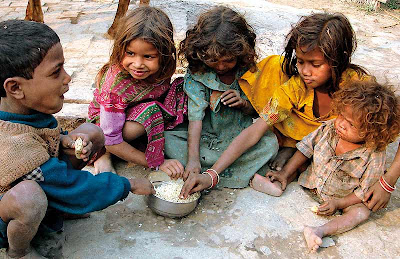Is poverty a necessary evil?
I grew up reading, watching and feeling poverty all around. It is
not a rarity if you are in a city or town in India. The towns and cities of
India are teeming with millions of poor people. Beggars asking for alms, old
and helpless begging on the roads all these are a very common sight in any city
or town in India. While people in villages might not have to beg but there is a
different form of poverty there. Millions in the Indian villages live a life
full of hardships, toil, misery and disease.
Even my initial years were not very plentiful, though there was
enough and my parents ensured that my brother and I had all our basic
necessities covered. But I did get a close look at what poverty means and how
the poor in this country live while I was growing up in Ranchi. It was a
constant reminder for me to take the opportunities that life gave me and be
thankful because there are others who did not get as lucky as I got. When I
look back at times and compare myself with some of my cousins who live in my
ancestral village in Ballia, U.P, I think I just got lucky!
At times I get saddened when my roommates waste food, keep the
light turned on and leave the tap running, not because of their apathy or my
greatness, it’s because down in my heart I know that there are millions in this
country who live on one meal a day or maybe even less, there are millions who
pass the night in dark every night and for whom even one hour of electricity is
a big luxury and then there are millions who do not have clean water to drink
leave along bath. If we are not doing anything for these people, the least we
can do is show some gratitude in life and not waste resources.
While in Ranchi, I got a real feel of the extent of poverty and
misery that is prevalent in this country. My father started his career as a
site supervisor in a construction firm and hence there was always some support
for the household work to my mom. Generally the female day labourers would be
given 1hr time off from the site to do the cleaning of utensils and the house.
It was kind of a win-win for both the parties. While we got household help, the
female day labourer got 2 hours of less intense physical labour. After all
cleaning utensils in the house was far better than carrying bricks and mortar
at a construction site.
Most of these day labourers were adivasis or the tribals or the so called 'adivasis' of
Jharkhand. A typical labourer, at least the female labourers, was someone whose
husband was either a rickshaw puller or a daily wage labourer and more often
than now was generally a drunkard. The male member by virtue of his drinking
habit would spend all that he earned on drinks, leaving very little or nothing
for the household. Thus, the wife was left with no option but to seek work and
earn to keep the fire in the kitchen burning. It was a sight, quite a pity
sight to see an adivasi women carry her child to the construction site, keep
the baby in the shade and work all the day. But most of these women were proud
and would work rather than beg.
I remember somewhere in 1997-1998 when the prices of onions had
skyrocketed to Rs. 60 per kg from the usual Rs. 6 per kg and prices of other
daily items soared, a labourer told us how she used water instead of oil and
onions to ‘fry’ the vegetables and how they had completely switched from the
one vegetable a day meal to a starchy rice based meal with salt and chilies for
taste. To me that is poverty and helplessness.
While I was in Manipal and Bangalore, I became a bit secluded from
the reality of Indian poverty in the glitz and glam of these places. However,
after I came to Calcutta I brushed my shoulders again with poverty. Probably
this city is still affordable because of the teeming poverty that millions of
people in this city live with. Although, politics and power changed hands
in West Bengal, however I don't see much change on the ground. People are migrating
from this state in hordes looking for work in places such as Delhi, Bangalore
and Mumbai. No wonder Mother Teresa choose this place as her karam bhoomi!
Just imagine had your household maid/ help not been poor, would he
or she have agreed to do the cleaning? Perhaps not! Had there not been poverty
would people work in construction sites, coal mines? Our society needs the poor
to do the tasks that many of us who have better access to resources don't want
to do. Sometimes I feel that after all poverty is a necessary evil!
Image Source: Outlook




Comments
Poverty is evil, and unnecessary for the society.